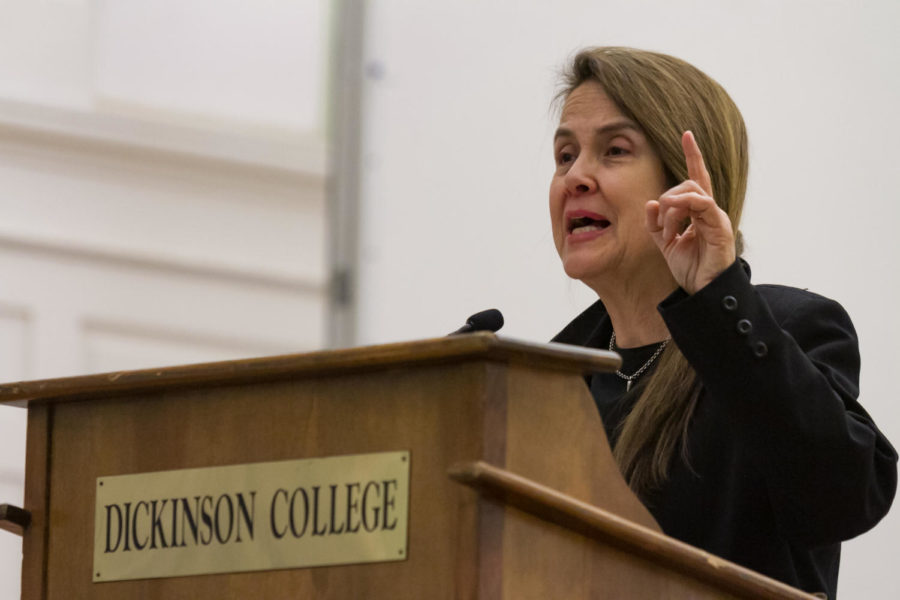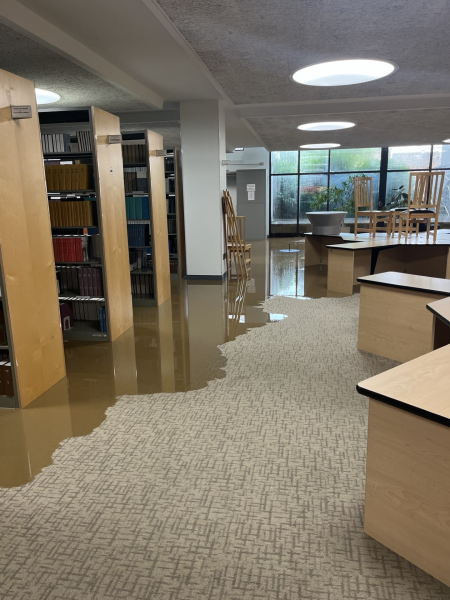Stellfox Scholar Speaks of Diplomacy, Food
Naomi Shihab Nye spoke of the purpose of poetry, the importance of diplomacy and the ways her father has impacted her writing in a poetry reading as part of receiving The Harold and Ethel L. Stellfox Visiting Scholars and Writers Program award.
At the event, President Margee Ensign introduced the Harold and Ethel L. Stellfox Visiting Scholars and Writers Program award, which was founded in honor of Jean Louise Stellfox when she left $1.5 million to Dickinson after her death. According to the Dickinson website, the award “brings major literary figures to campus for an inter-arts residency.”
Professor of Creative Writing and Poet-in-Residence Adrienne Su introduced this year’s award recipient, Naomi Shihab Nye, a Palestinian American writer who has published novels, essays and short stories in addition to several poetry collections that include 19 Varieties of Gazelle: Poems from the Middle East, a finalist for the National Book Award.
Dickinson students have expressed a “deep appreciation [of Nye’s writing],” said Su as she named Nye “a [Robert] Frost of our time.”
Nye began by thanking Dickinson for providing her with an “exhaulted space” such as the Allison Great Room to speak in. She then proceeded to read two poems by other poets who have inspired her: “The Way it Is” by William Stafford and “Lighthouse Keeping” by Kay Ryan. Nye commented that she thinks “Teachers are lighthouse keepers, and poetry keeps spreading its light” and insisted “all poets we love guide us.”
She continued to read her own poems and recount anecdotes relating to the poem in question. One such poem was inspired by a conversation she had overheard in an airport. “I’m always paying attention in airports because it’s a good place to eavesdrop” she explained. “How can you not love being in airports…these spaces of sound and people you don’t know?”
Nye also spoke in depth about her father and his regular correspondence with First Lady Eleanor Roosevelt. Her father, as a Palestinian immigrant, often voiced his opinions on the lives of immigrants in the U.S., frequently writing newspapers because, “editors are always waiting to hear from you,” stated Roosevelt.
“And she wrote back,” said Nye. “I do like that [Roosevelt] hand-wrote responses to her immigrant correspondences.”
Nye also spoke of her father’s influence on her poetry, especially through the use of her images of food. “My father really loved the idea of food as talisman,” she said. “For me, poems really need flavor and zest, and food is one way to get there…If you can write about an eggplant and be talking about politics, that’s really great. In fact, I’d rather hear about an eggplant than about politics.”
“I really believe in diplomacy,” Nye said of her the political nature of some of her poems. “I like embassies…secret diplomats are what we must be.” She added that “Poets never assume that people will read their poems, we just hope that now and then it will happen.” On the purpose of poetry, Nye said the question of “Where are you?” is integral because “This is what poetry tries to help us answer every day.”
Nye addressed her writing in various genres, including essays, novels, and short stories in addition to poetry. “We need more than one style to keep us going…People tend to put themselves in little boxes…[And I ask them,] ‘Well, what is wrong with you?,’” she explained.
Nye was well received by students. Cara Doughtery ’21 said she found meeting Nye “rewarding” and felt that she brought a “great mood on campus.”
Michaela Zanis ’19 “wasn’t expecting her to be as funny as she was. For dealing with such a serious topic [9/11 and the Israel-Palestine conflict] in her poetry [in 19 Varieties of Gazelle] it was nice that she has a sense of humor…It’s interesting to see her establish a global community through the same metaphors and ideas…I love the eggplant.”
Audrey Schlimm ’20 mentioned that “When we read her poems in class, there’s this very human quality to [Nye’s] work and the very small details, the little ordinary things that exist, and then to hear her speak in person and just exemplify those themes and those feelings, that I got from her poetry, it amazing, so [I’m] just really impressed and amazed overall from hearing her speak.”
Nye’s presentation on Monday, March 5 was followed immediately by a reception and book signing.





